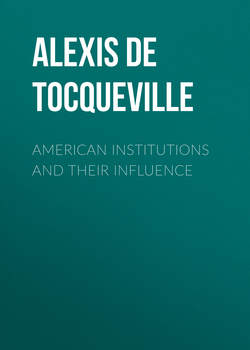Читать книгу American Institutions and Their Influence - Alexis de Tocqueville - Страница 30
AMERICAN INSTITUTIONS
CHAPTER VIII
PREROGATIVE OF THE FEDERAL GOVERNMENT
ОглавлениеPower of declaring War, making Peace, and levying general Taxes vested in the Federal Government.—What Part of the internal Policy of the Country it may direct.—The Government of the Union in some respects more central than the King's Government in the old French monarchy.
The external relations of a people may be compared to those of private individuals, and they cannot be advantageously maintained without the agency of the single head of a government. The exclusive right of making peace and war, of concluding treaties of commerce, of raising armies, and equipping fleets, was therefore granted to the Union.127 The necessity of a national government was less imperiously felt in the conduct of the internal affairs of society; but there are certain general interests which can only be attended to with advantage by a general authority. The Union was invested with the power of controlling the monetary system, of directing the post-office, and of opening the great roads which were to establish communication between the different parts of the country.128 The independence of the government of each state was formally recognized in its sphere; nevertheless the federal government was authorized to interfere in the internal affairs of the states129 in a few predetermined cases, in which an indiscreet abuse of their independence might compromise the security of the Union at large. Thus, while the power of modifying and changing their legislation at pleasure was preserved in all the republics, they were forbidden to enact ex post facto laws, or to create a class of nobles in their community.130 Lastly, as it was necessary that the federal government should be able to fulfil its engagements, it was endowed with an unlimited power of levying taxes.131
In examining the balance of power as established by the federal constitution; in remarking on the one hand the portion of sovereignty which has been reserved to the several states, and on the other the share of power which the Union has assumed, it is evident that the federal legislators entertained the clearest and most accurate notions on the nature of the centralisation of government. The United States form not only a republic, but a confederation; nevertheless the authority of the nation is more central than it was in several of the monarchies of Europe when the American constitution was formed. Take, for instance, the two following examples:—
Thirteen supreme courts of justice existed in France, which, generally speaking, had the right of interpreting the law without appeal; and those provinces, styled pays d'etats, were authorized to refuse their assent to an impost which had been levied by the sovereign who represented the nation.
In the Union there is but one tribunal to interpret, as there is one legislature to make the laws; and an impost voted by the representatives of the nation is binding upon all the citizens.
In these two essential points, therefore, the Union exercises more central authority than the French monarchy possessed, although the Union is only an assemblage of confederate republics.
In Spain certain provinces had the right of establishing a system of customhouse duties peculiar to themselves, although that privilege belongs, by its very nature, to the national sovereignty. In America the congress alone has the right of regulating the commercial relations of the states. The government of the confederation is therefore more centralized in this respect than the kingdom of Spain. It is true that the power of the crown in France or in Spain was always able to obtain by force whatever the constitution of the country denied, and that the ultimate result was consequently the same; and I am here discussing the theory of the constitution.
127
See constitution, sect. 8. Federalist, Nos. 41 and 42. Kent's Commentaries, vol. i., p. 207. Story, pp. 358-382; 409-426.
128
Several other privileges of the same kind exist, such as that which empowers the Union to legislate on bankruptcy, to grant patents, and other matters in which its intervention is clearly necessary.
129
Even in these cases its interference is indirect. The Union interferes by means of the tribunals, as will be hereafter shown.
130
Federal Constitution, sect. 10, art. 1.
131
Constitution, sect. 8, 9, and 10. Federalist, Nos. 30-36 inclusive, and 41-44. Kent's Commentaries, vol. i., pp. 207 and 381. Story pp. 329 and 514.
